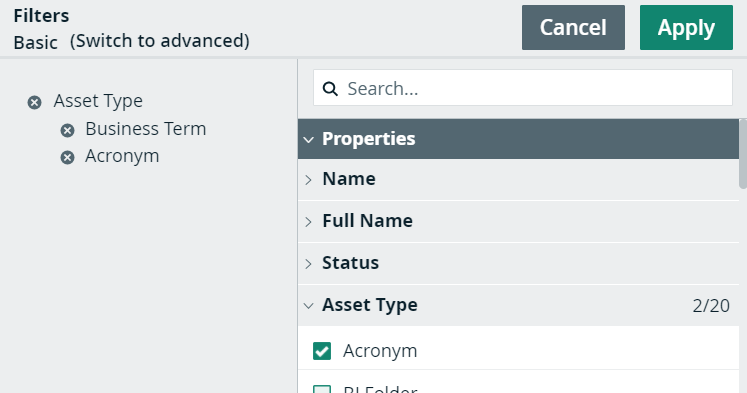This feature isn't available in the latest UI.
You can create basic filters by adding filter conditions. A filter condition is created by selecting a characteristic and assigning one or more values to it. In a basic filter, you can combine multiple conditions.
The characteristics are grouped in the following categories:
- Properties: All the asset properties in Collibra, for example, asset type, name, and tags.
- Attributes: All the asset attributes in Collibra, for example, definition, note, and quality.
- Relations: All the relations in Collibra.
- Roles: All the resource roles defined in Collibra, for example, Assignee, Business Steward, and Requester.
For information about how to add characteristics to a filter, go to Create a basic filter.
Filter behavior
- Multiple values for one characteristic are treated as an OR operator. The filter shown in the following image filters the assets if the asset type is Acronym or Business Term.

- All the simple conditions in a basic filter are treated as an AND operator.
- You can remove a filter characteristic by clicking
 next to the filter characteristic that you want to delete, or you can remove a single value from a filter characteristic by clicking
next to the filter characteristic that you want to delete, or you can remove a single value from a filter characteristic by clicking  next to its value.
next to its value.
Other filter aspects
- If you use filters in hierarchy views (not available in tile display mode), Collibra applies the filter only at the root (start) level of the hierarchy. Child rows are not filtered.
- In the Roles category of the filter characteristics, you can select one or more specific users or user groups, or current user to filter on the signed-in user. This has the advantage that it is not necessary to create a filter for every single user.
Example
- Filter assets by "current user" with Reviewer responsibility: If user A is signed in, the table shows the assets for which User A has the Reviewer responsibility. If user B is signed in, the table shows the assets for which User B has the Reviewer responsibility.
- The Roles category of a basic filter does not consider inherited responsibilities. If you want to include inherited responsibilities in the filter criteria, you can use an advanced filter.